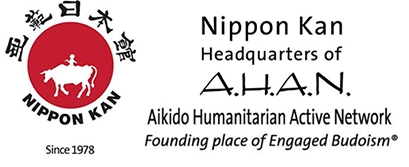Aikido Nippon Kan in Denver, Colorado, may be known mainly as an Aikido dojo, but its operations and activities differ from those of most other Aikido schools. For instance, over the years, Aikido Nippon Kan has developed a program to feed the homeless, and it has assisted the Denver Parks and Recreation Department with annual tree planting and flowerbed projects. It has also developed a cross-cultural exchange program with a traditional village in northern Japan, where the culture of past centuries can still be experienced first hand.
Aikido Nippon Kan was founded by Gaku Homma Sensei, who is also head chef of Domo Restaurant and the author of several books. Homma Sensei has been a leader in spreading the teaching of Aikido as well as in creating a mutual understanding between Japanese and Americans.
I was an uchideshi (“live-in student”) at Aikido Nippon Kan for six months. Uchideshi are students who are allowed to live with their senseis so that they can devote themselves to their training. Most Japanese arts whose names end in “do” — like Judo, Chado (the way of tea), and Aikido — have uchideshi programs for dedicated students. Usually, uchideshi are expected to put their personal lives aside and to devote themselves to training in order to master their chosen arts. Being an uchideshi is not easy, but uchideshi tend to improve rapidly.
I enrolled in Aikido Nippon Kan’s Uchideshi Program in June 1995, and I remained an uchideshi for 6 months. My original plan was to stay at Nippon Kan for the summer and to return to the university in the fall to complete my degree. But soon after my arrival at Nippon Kan, I realized that there was much more to being an uchideshi than learning Aikido techniques. So, I devised a plan to continue my stay while earning credits toward my degree. I applied for a full-time business internship through the university, focusing my studies at Nippon Kan on the management of a federal non-profit organization, which Aikido Nippon Kan officially is. As I was majoring in business management, the internship game me the opportunity to stay at Nippon Kan for three more months.
There were six or seven other uchideshi living and training with me. Although we rotated tasks, there were always many things that needed to be done around the dojo. We usually completed major daily chores in the morning. In the afternoon, we practiced Aikido on our own. In the evening, we prepared the dojo for opening. After we attended a couple of regular classes, we closed the dojo. That usually ended our day, but when urgent tasks needed to be done, our day would continue.
As time went on, we became more efficient at completing our tasks; uchideshi acquire time-management skills.
The uchideshi at Aikido Nippon Kan also learned to develop their own leadership styles. Alluchideshi were expected to take the initiative in such special activities as the monthly dinner for the homeless. In such activities, we directed the regular Nippon Kan members and other volunteers so that our aims were smoothly, flawlessly, and successfully achieved. As an uchideshi, I learned the importance of good leadership and gained confidence in my ability to lead well.
Another benefit of being an uchideshi at Nippon Kan was the exposure to many different people. Nippon Kan is like an interchange on the freeway; people from different backgrounds and cultures are always coming and going. While I was at Nippon Kan, one uchideshi was from Germany, another was from Sweden, and another (me) was from Japan. Even so, all the uchideshirespected one another’s backgrounds and values. I would have never interacted with such a diversified group of people at a university.
Aikido Nippon Kan accepts uchideshi applicants throughout the year. Whether a person is accepted is, of course, determined by Aikido Nippon Kan’s policies as well as by the applicant’s attitude and commitment. Experience in Aikido is helpful, but not required.
Not all uchideshi are full-time as I was. When I was at Nippon Kan three of the seven uchideshiwere part-time; either they were students or they had full-time jobs during day.
When new uchideshi join the program, it is usually the responsibility of senior uchideshi to teach them Aikido Nippon Kan’s implicit and explicit rules. After newcomers have become accustomed to the environment, they decide whether to climb up the ladder or to continue at the bottom of the hierarchy. The Uchideshi Program is based on the merit system. Those who are eager and willing have a tendency to improve faster and to be recognized faster, whereas those who do not try hard tend to be left behind.
I spent one summer as an uchideshi and three months as an uchideshi-intern at Aikido Nippon Kan. Being an uchideshi was not easy; I have some bitter memories. Still, I learned about the management of a federal non-profit organization, I had the opportunity to meet people from all over the world, and I learned things that are important in my daily life. I am quite satisfied with the choice I made years ago, and I recommend the uchideshi experience and uchideshi-internships to others.
Reprinted with permission from Aikido Today Magazine.

